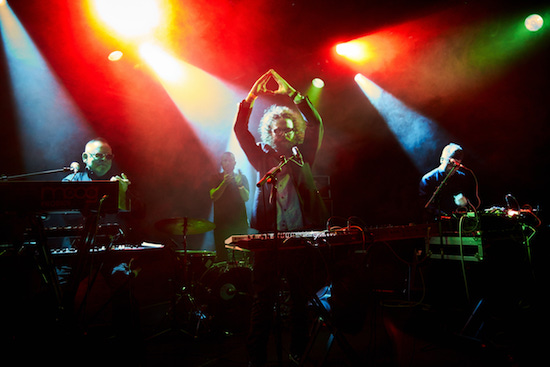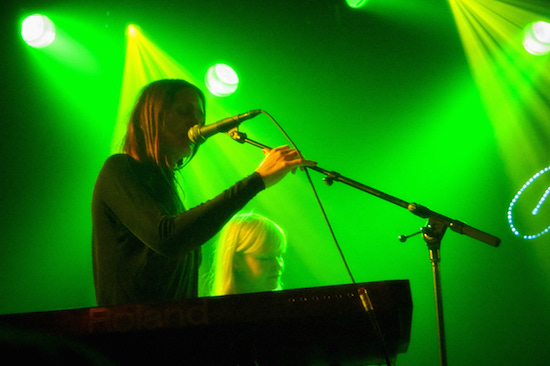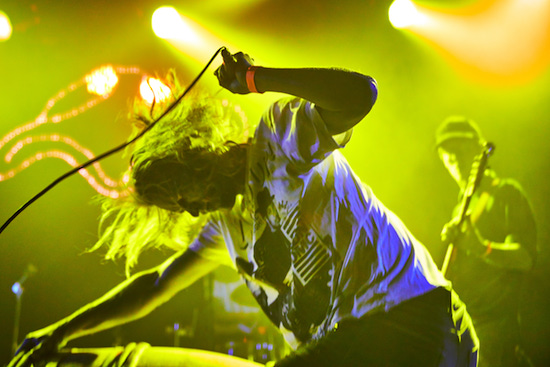All photographs courtesy of Justin Winokur
Before the Internet was born and if you weren’t a mainstream band, it was nearly impossible to get your music heard on the radio. Sure, there was public radio and lots of little college radio stations, but it was mostly a winners’ game.
Kim Gordon, Girl In A Band
The party started in Nørrebro on a Friday night and ended sometime after sunrise on Sunday. Jesper ‘Yebo’ Reginal Petersen, one of Crunchy Frog’s four co-founders, had worked for six months to pull it off, releasing a single from every active band on the label each week of the run-up, tying the whole celebration together with fourteen bands and thirteen DJs across three stages at the central Copenhagen venue Pumpehuset.
After four hours’ sleep he rallied the best-rested of the team for a two o’clock load out, carrying guitars, amplifiers, drumkits and keyboards which had to be driven to a series of bunkers under the city. Copenhagen has about a thousand of these subterranean igloos, originally built to protect Danish royalty in case of a cold war nuclear strike. Nowadays, though, they’re where Crunchy musicians practice, play – and in some cases live – in a bid to stay creative against a gradual tide of gentrification.
"The bunkers are common in Copenhagen," says Yebo, steering a white Volkswagen van past the Palads Cinema into the city centre. "Old wartime bunkers are used for rehearsal rooms. It’s where you put noisy rock bands. Underground."
For twenty-five years Yebo has been bringing the best of Copenhagen’s underground to stages not only in Europe but to New York, Japan, Los Angeles. The label he created with the members of THAU – the erudite noise-rock band that self-released their debut album Utah in 1994 – has become home to a roster of outsiders and alternative acts whose variety is matched only by their ambition. Yebo plays alongside his brother Nalna in dark surf-rock four-piece The Tremolo Beer Gut, whereas the indie band Felines could find a home on Heavenly Records. Others, like Johannes Gammelby’s The Malpractice, have more in common with groups on Ipecac.

The label had two dozen records behind them before Junior Senior’s debut album D-D-Don’t Don’t Stop The Beat created the global hit ‘Move Your Feet’ in 2002, a success that was followed quickly by The Raveonettes’ first EP Whip It On. These creditable pop hits emerged from a foundation of indie, noise-rock and borderline-industrial bands that had been playing in Copenhagen for almost a decade, principally at Crunchy’s club night, Propdenoppop-Klop.
"There were bands like THAU, Tothe International, Learning From Las Vegas and Düreforsög," says Yebo. "We booked Mew for their very first show. There were other bands that never got around to recording, or kind of imploded or whatever. But it was quite a small scene and a lot of people were helping out, so there was this sense of community. When we started working with Superheroes, for instance, which was the first more pop band, they really liked what we were doing. They quickly started to get airplay and sell many more records, but I remember Thomas [Troelsen, who went on to produce for Nile Rodgers, Lil Wayne and Justin Bieber] said, ‘We’re the small moped riding next to the limousine, which is Crunchy Frog’."
The sense of community between Crunchy bands grew through things like Christmas tours and musicians enthusiastically getting involved in one another’s records. "Without being too cerebral about it all, it was just cool,’ says Yebo. "Having fun times together, and having the bands fall in love with each other’s music. I mean now, we have Apparat [Apparat Organ Quartet], from Iceland. They don’t know all the bands intimately, but now they’ve been at several of these events. The others are like, ‘Wow: Apparat: they’re amazing!’. We get to say, ‘Yeah! We told you!’."

At the tail end of the 80s, bands like Sonic Youth and My Bloody Valentine provided both creative and organisational inspiration. "I think they showed the way," says Yebo. "That you could do really experimental stuff that’s also really beautiful. That you could do stuff that’s so extreme, you know? For the Copenhagen scene it was definitely My Bloody Valentine, Sonic Youth, Dinosaur Jr and the Pixies. The grunge bands didn’t approach noise the same way. Sonic Youth is like art-rock that also happens to be noisy."
By 2004, Junior Senior had been licensed to Atlantic and The Raveonettes had graduated to Columbia, giving Crunchy Frog a prominence that attracted artists who remain with them to this day. As part of the cinematic and elegant indie-pop group EPO-555, Camilla Florentz sought out the label specifically to release debut album Dexter Fox in 2005 and Mafia in 2006.
"I didn’t have any idea that this was what I was going to be doing when I moved to Copenhagen," she says. "But all of a sudden I met [bandmates] Mikkel and Ebbe, and we were chasing Crunchy Frog, because to us that was the only indie label that was good enough to have us."
From the beginning, Crunchy Frog has signed bands on a 50/50 basis. "I think Crunchy was the first and probably the only label in Denmark to have that kind of set-up," says Florentz. "And the thing with the 50/50 deal is the sense of being in the same boat. It creates motivation. We were all equal. It’s democratic – it’s as important to them as it is to us."

EPO-555 toured in America, Iceland and Germany before disbanding, though the same members perform today as the Oliver North Boy Choir (ONBC). Although playing music has rarely been a break-even proposition, Florentz says the simple fun of it all has kept them together when others may have given up entirely.
"I remember someone saying at that point, ‘Those EPO guys, they must make a lot of money.’ That’s not really how it works," she says. "These are small productions. There’s a small crowd for alternative indie music, and Denmark is a small country. If you want to do this kind of music you really have to strike the big deal somewhere else – probably abroad. Some people do. We put in the work that was needed, but we also wanted to have educations, and have families, and all of these things. So to me, Crunchy Frog is integrity. It would be lovely to strike a deal and sing on the third series of Twin Peaks or whatever, but really for us it’s about maintaining this creativity and being able to do it with Crunchy Frog."
In 2019 Crunchy are making peace with the idea that sales and streaming will only go so far towards making any real money. But coupled with the 50/50 approach to deals is Yebo’s foresight around publishing. From the earliest days of THAU, he was aware of the importance of generating even small income streams from public performance on radio play or sync deals with other media.
"A lot of labels never did publishing," he says. "But we always did, because we were a band releasing ourselves. I was the primary songwriter, but it was so obvious, that after doing all the work of promoting the band and recording, that money coming in from public performance went to the publishing company, Crunchy Tunes. Now we work with publishers across the globe, and push music across the world."
The publishing side has resulted in deals with films, say, or advertisers, that have helped to keep the label and artists afloat. Any time a buyer licenses a song to use, they also license the master recording. "It was always part of Crunchy," says Yebo. "When people started doing 360 deals and stuff like that, well, we’ve always been doing that, because we always thought of it as a holistic thing."

This has meant the strange sounds of the psychobilly band Powersolo – a group that has been touring for 21 years and signed with Crunchy for 15 – cropping up on Argos ads in the UK with ‘Boom Babba Do Ba Dabba’. "For some reason, that totally crazy band has gripped advertising," says Yebo. "Because they make these super-catchy songs that also have a lot of grit and flavor and edge they’ve been in car commercials for Honda, Ford, Renault, they’ve been in Guinness, Heineken, Absolut Vodka. It’s a lot of ads. With Argos, they got renewed! It was on British television for two years."
"I’ve had 22 musicians with Powersolo over the years," says frontman Kim Kix. "Men and women, five different nationalities – we adapt." Powersolo are one of the most active live bands on the label, appearing in London venues like the Victoria, the Shacklewell Arms, and Oslo in Hackney, often to varying crowds.
"We can play shows in London and there are only 20 people in the room," says Kix. "But they aren’t any different, from our perspective. We pretty much play with full gas at all times. Any place is a new place. When it’s full and it’s all going, it’s nice. Those times when you walk in and people go nuts before you even touch your instrument, you gotta go in and say, ‘Listen, motherfuckers. I’m in charge here.’ I bring it down, and then I build ’em up again. That’s the job."
"Touring the UK is something that bands want to do," says Yebo. "I mean, we have distribution, and we’ve had many a showcase, but London is just a tough nut to crack. For some bands, it makes more sense than others. Powersolo have done several tours, and people come out, love it, and tell their friends. But you have to be in a band with the kind of grit that Powersolo has. It’s like, alright: do it the hard way. Work, work, work, often without press."

It’s taken 25 years for Yebo to realize with some surprise that Crunchy Frog has become his job, though his evident passion is something that he couldn’t have avoided. His father was a programmer at Danish Radio, the equivalent of the BBC, who would set off at night to play music on the station P3. He became known as the voice of nighttime radio, putting together features on The Beatles and The Beach Boys and Duke Ellington.
"At home, we kids were allowed to play the seven-inches, but not the albums," says Yebo. "But when we were a little older, we might go with him to work, and you could just pick up free records. Even after I moved away from home I’d swing by his office. He got sent everything from all the labels, yet he only took a small selection, and it was, ‘Yeah – you can take them’."
Even more special was access to Danish Radio’s full library; the so-called ‘Discotheque’, rooms filled with every record they had on file. "I mean all the records," says Yebo. "As a kid I was able to borrow the card. And so when I discovered stuff like Depeche Mode, I got it all. And of course, I made tapes. Almost like Spotify, right? Also, they had a big library of BBC live recordings. One small room that was just shelves of BBC live recordings. If you were into a band, you could go and get a live recording that nobody had. This wealth of music that was available to me. I basically had Spotify as a kid. I mean, I actually had the possibility of discovering something and then really going deep into the discography."
After 25 years, the label still tries to operate on a one-at-a-time release basis, and despite certain successes, thinks in wry terms of opposition to the mainstream. "Of course we’re part of it now," says Yebo. "I mean we’ve got the ‘Corporate Rock Sucks’ thing that we lifted from SST Records, which is a bit of a joke, but it tells you something that we’re still in opposition to making art purely to make money.
"To do a record with a really small niche band that probably won’t sell a lot and definitely won’t get on the radio? That’s how we started out. Releasing records basically just to get our own copy, and because it deserves to be released. It’s a cool thing to have done. So even if you lose money, or you end up working months without earning anything, it’s still a very cool thing to have done."
Crunchy Frog artists are on tour in Europe now. See www.crunchy.dk for full information


